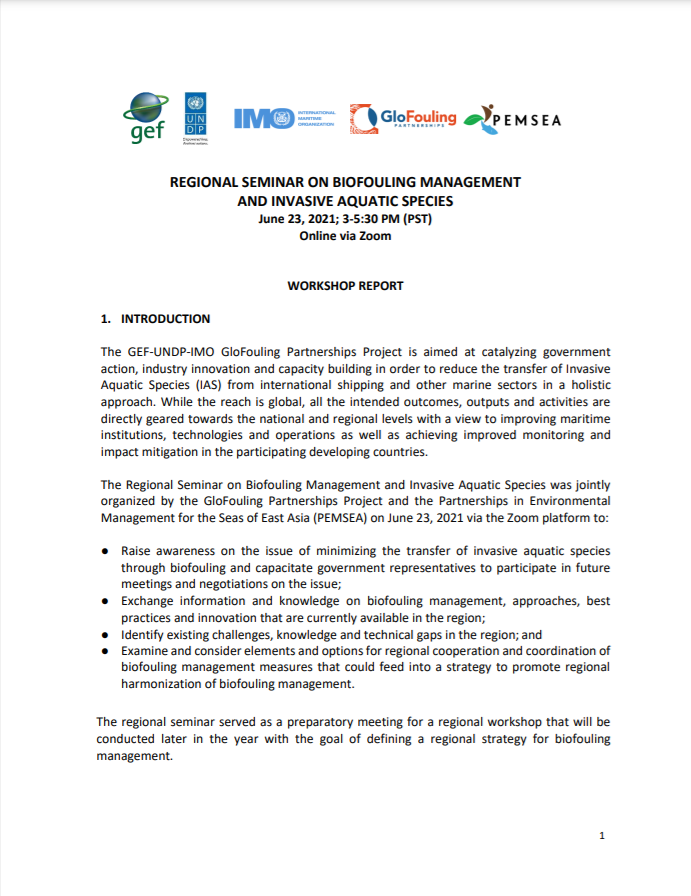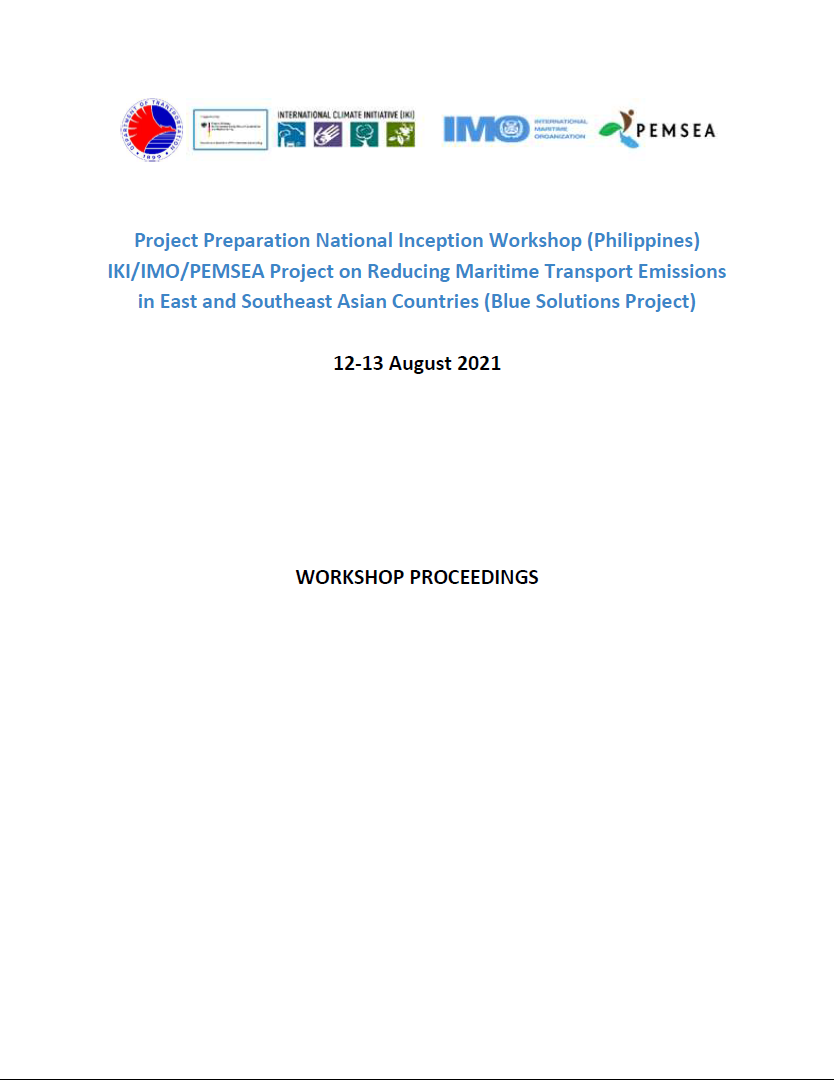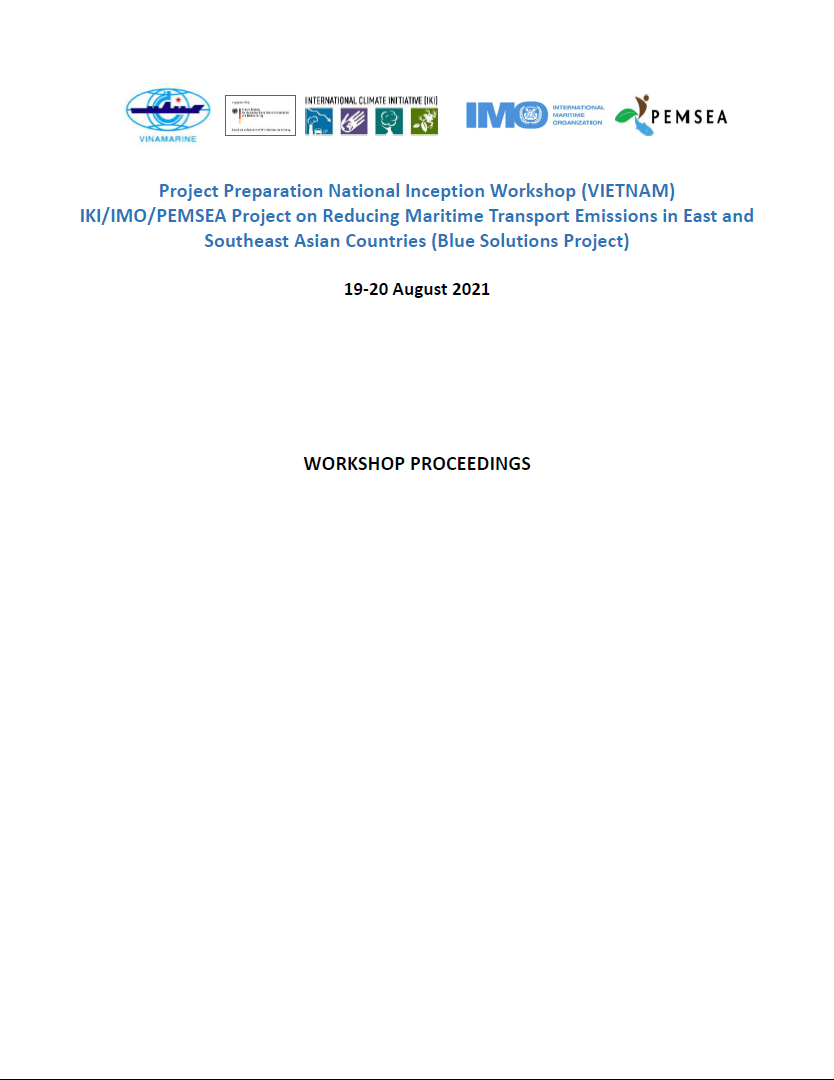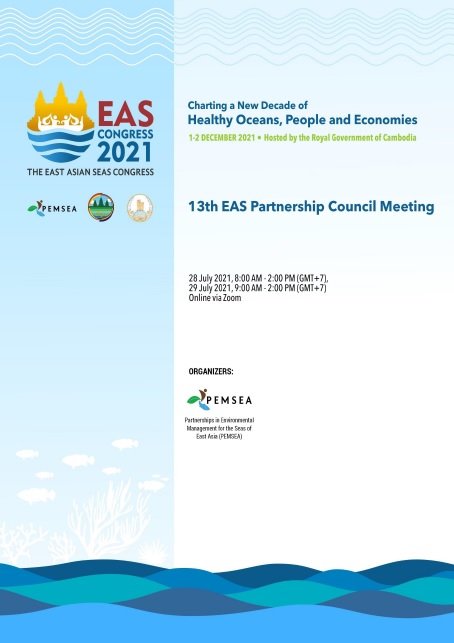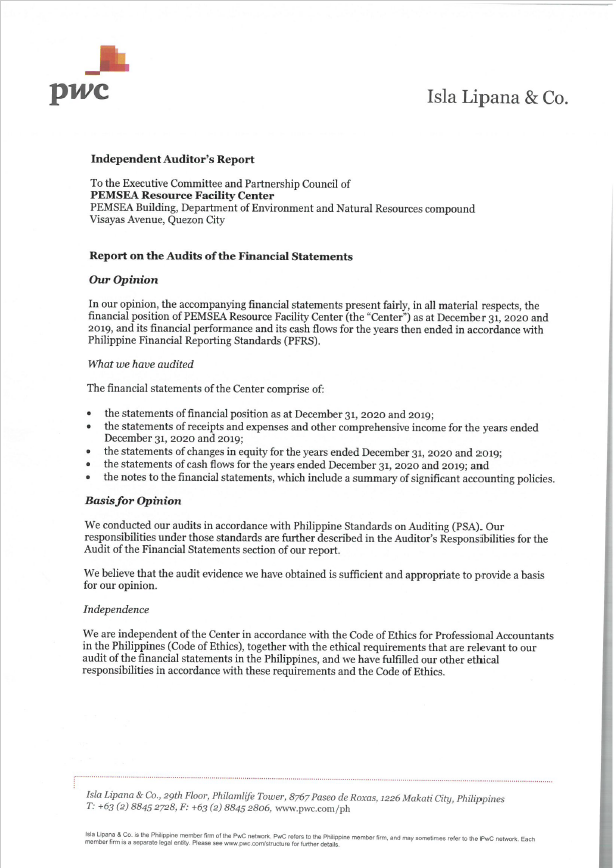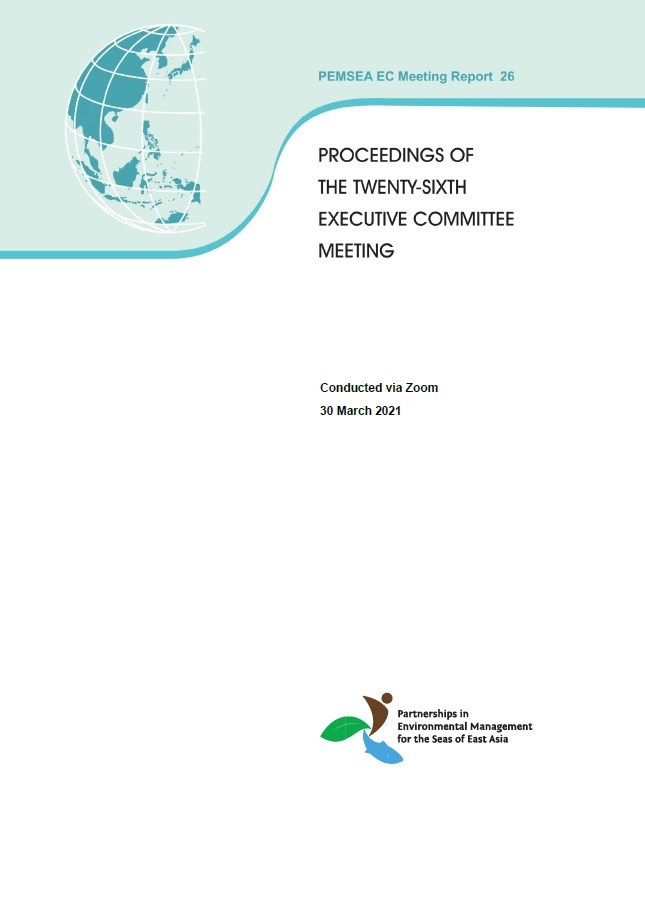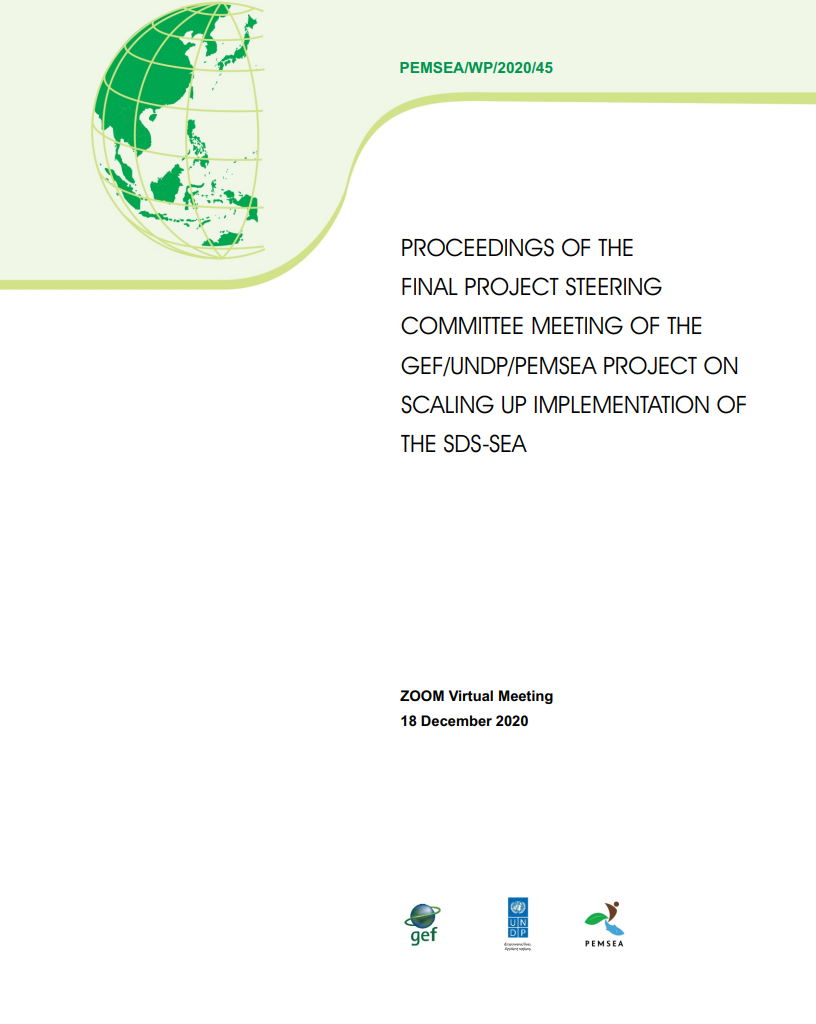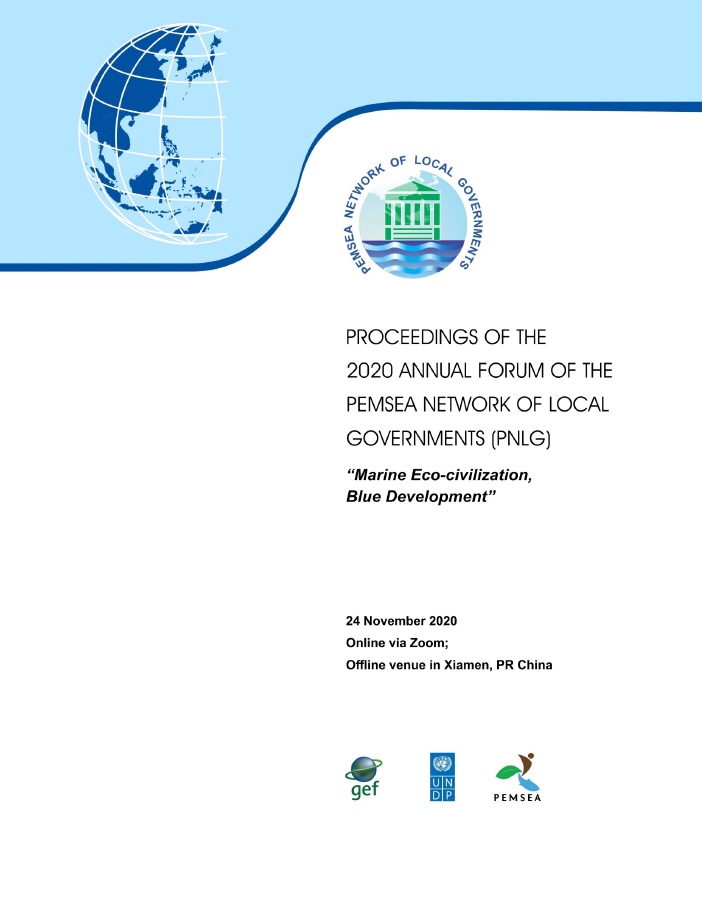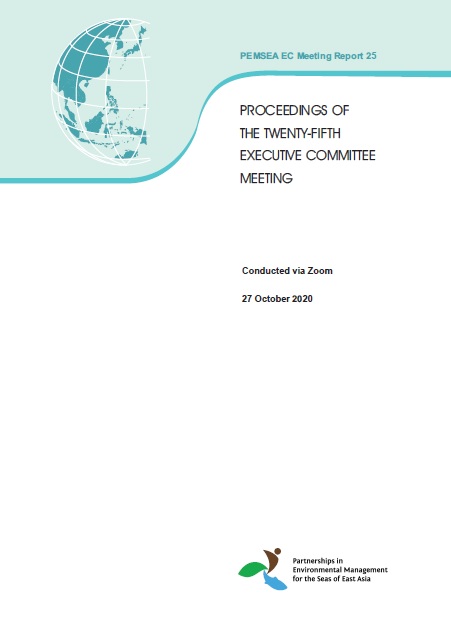
Breadcrumb
-
Proceedings of the Regional Seminar on Biofouling Management and Invasive Aquatic Species
The GEF-UNDP-IMO GloFouling Partnerships Project is aimed at catalyzing government action, industry innovation and capacity building in order to reduce the transfer of Invasive Aquatic Species (IAS) from international shipping and other marine sectors in a holistic approach. While the reach is global, all the intended outcomes, outputs and activities are directly geared towards the national and regional levels with a view to improving maritime institutions, technologies and operations as well as achieving improved monitoring and impact mitigation in the participating developing countries. The Regional Seminar on Biofouling Management and Invasive Aquatic Species was jointly organized by the GloFouling Partnerships Project and the Partnerships in Environmental Management for the Seas of East Asia (PEMSEA) on June 23, 2021 via the Zoom platform to:
- Raise awareness on the issue of minimizing the transfer of invasive aquatic species through biofouling and capacitate government representatives to participate in future meetings and negotiations on the issue;
- Exchange information and knowledge on biofouling management, approaches, best practices and innovation that are currently available in the region;
- Identify existing challenges, knowledge and technical gaps in the region; and
- Examine and consider elements and options for regional cooperation and coordination of biofouling management measures that could feed into a strategy to promote regional harmonization of biofouling management.
The regional seminar served as a preparatory meeting for a regional workshop that will be conducted later in the year with the goal of defining a regional strategy for biofouling management.
-
Proceedings of the Blue Solutions Philippines National Inception Workshop
This event is part of a series of national inception workshops being held with participating countries of the International Climate Initiative/ International Maritime Organization/Partnerships in Environmental Management for the Seas of East Asia (IKI/IMO/PEMSEA) Project on Reducing Maritime Transport Emissions in East and Southeast Countries (Blue Solutions Project). This is a follow-on to the regional kick-off meeting for the preparation phase of the overall project held on 18 June 2021. These national inception workshops will initiate the country-specific discussions on the preparation of the full proposal for a pilot project within each country.
The national inception workshop for the Philippines was held virtually from 12-13 August 2021. It was jointly organized by the Department of Transportation (DoTr), which serves as the National Focal Agency for the Project, the IMO, and PEMSEA.
The aims of this workshop were to:
- Introduce the scope, objectives, and components of the Blue Solutions project, including the timeline and implementing arrangements for the national project preparation;
- Understand the principal targets and challenges to greenhouse gas (GHG) reduction in the maritime sector in the Philippines;
- Discuss the identification of a national GHG reduction pilot demonstration project in the Philippines; and
- Delve into the national assessment of GHG emissions in the maritime sector in the Philippines.
-
Proceedings of the Blue Solutions Viet Nam National Inception Workshop
The national inception workshops in participating countries including Vietnam are follow-on activities to the regional kick-off meeting for the preparation phase of the International Climate Initiative/ International Maritime Organization/Partnerships in Environmental Management for the Seas of East Asia (IKI/IMO/PEMSEA) Project on Reducing Maritime Transport Emissions in East and Southeast Countries (Blue Solutions Project) that was conducted on June 18, 2021 to initiate the country-specific discussions on the preparation of the full proposal for the aforementioned project.
The national inception workshop for Vietnam was held virtually on August 19 and 20, 2021 and jointly organized by the Vietnam Maritime Administration (VINAMARINE), which serves as the National Focal Agency for the Project, the IMO and PEMSEA.
The 1.5-day national inception workshop was organized to:
- Introduce the scope, objectives and components, including timeline and implementing arrangements for the national project preparation;
- Understand the principal targets and challenges to greenhouse gas (GHG) reduction in the maritime sector in Vietnam;
- Discuss the identification of a national GHG reduction pilot demonstration project in Vietnam; and
- Delve into the national assessment of GHG emissions in the maritime sector in Vietnam.
-
Proceedings of the 13th East Asian Seas Partnership Council Meeting
The 13th East Asian Seas (EAS) Partnership Council (PC) Meeting was held virtually on 28-29 July 2021 through a Zoom conference call. Representatives from 10 PEMSEA country partners (CPs) namely Cambodia, China, Indonesia, Japan, Lao PDR, Philippines, RO Korea, Singapore, Timor-Leste, and Viet Nam attended the meeting. Also in attendance were representatives from PEMSEA non-country partners (NCPs), namely the ASEAN Centre for Biodiversity (ACB), International Environmental Management of Enclosed Coastal Seas (EMECS) Center, IPIECA, Korea Marine Environment Management Corporation (KOEM), Northwest Pacific Action Plan (NOWPAP), Ocean Policy Research Institute, The Sasakawa Peace Foundation (OPRI-SPF), Oil Spill Response Limited (OSRL) and PEMSEA Network of Local Governments (PNLG).
Representatives from the PEMSEA Network of Learning Centers (PNLC), China-PEMSEA Sustainable Coastal Management Cooperation Center (CPC), and Provincial Administration of Preah Sihanouk (SHV) Cambodia) participated as guests. The PEMSEA Resource Facility (PRF) served as the Secretariat for the meeting.
-
Proceedings of the Twenty-sixth Executive Committee Meeting
The 26th EC Meeting was held virtually on 30 March 2021 via a Zoom conference call. The meeting was an expanded one and was attended by the EC members and country- and non-country partners of the East Asian Seas (EAS) Partnership in light of key decisions that need to be made on the nature and format of the EAS Congress 2021 , following the agreement of the 25th EC Meeting held on 27 October 2020. The PEMSEA Resource Facility (PRF) served as the secretariat for the meeting.
DOCUMENT NUMBER DOCUMENT TITLE EC/26/DOC/01a List of Documents EC/26/DOC/01b Zoom Meeting Guidelines EC/26/DOC/01c Opening Remarks EC/26/DOC/01d Provisional Annotated Agenda of the Council and Technical Session EC/26/DOC/02 2020 PEMSEA Accomplishments EC/26/DOC/03 EAS Congress 2021 EC/26/DOC/06 Provisional Annotated Agenda of the Intergovernmental Session EC/26/DOC/07 Draft Conceptual Framework for the 7th Ministerial Declaration EC/26/DOC/08 Proposed 2021-2022 Work Plan and Budget of the PRF EC/26/DOC/10 Closing remarks
-
Final PSC Meeting of the GEF/UNDP/PEMSEA Project on Scaling up Implementation of the SDS-SEA
The Final Project Steering Committee Meeting of the GEF/UNDP/PEMSEA Project on Scaling up the Implementation of the Sustainable Development Strategy for the Seas of East Asia (SDS-SEA) was conducted virtually through a zoom video conference call on 18 December 2020. The Meeting was attended by representatives from eight project participating countries, namely: Cambodia, China, Indonesia, Lao PDR, Philippines, Thailand, Timor-Leste and Vietnam. Representatives from the United
Nations Development Programme (UNDP) Philippines were present on behalf of the Global Environment Facility (GEF) and the United Nations Development Programme (UNDP). Representatives from the China-PEMSEA Center and PEMSEA Network of Learning Centers participated as observers. The SDS-SEA Terminal Evaluation Consultants at the international level as well as national consultants from the eight project member countries were present as key resource persons. The PEMSEA Resource Facility (PRF) served as Secretariat for the Meeting.Overall, the meeting focused on the key achievements or progress of the project from 2014 to 2020, the initial findings, assessment and recommendations from the ongoing project terminal review, and the work plan for the completion of the project’s operational and financial closure. The Final PSC Meeting made the following major recommendations:
- The PRF to validate the coverage of Integrated Coastal Management (ICM) in the region and to document ICM key accomplishments to serve as basis in further scaling-up of ICM to other sites in the future.
- The PRF and the Terminal Review to highlight the key accomplishments and contribution of the project in support of climate change adaptation and in strengthening resilience of coastal communities.
- The Terminal Review Team to finalize the first draft of the Terminal Evaluation report for dissemination to PSC members on the week of December 21, 2020 for review.
- PSC members to submit their comments on the draft Terminal Evaluation report by January 8, 2021.
- The adoption of the proposed work plan and timeline to complete the operational and financial closure of the project.
DOCUMENT NUMBER DOCUMENT TITLE PSC/2020/DOC/01 Meeting agenda PSC/2020/DOC/02 Matters arising from 2019 PSC/2020/DOC/03 Overall project accomplishments PSC/2020/DOC/04 Evaluation of the GEF PEMSEA project PSC/2020/DOC/05 Project closure
-
Proceedings of the 2020 Annual Forum of the PEMSEA Network of Local Governments (PNLG)
The 2020 Forum of the PNLG with the theme, “Marine Eco‐civilization, Blue Development” was hosted by the Xiamen Municipal Government and co‐organized by the PNLG Secretariat, the PEMSEA Resource Facility (PRF), the Fujian Institute for Sustainable Oceans (FISO) and Coastal and Ocean Management Institute (COMI) of Xiamen University (XMU). The forum was conducted on 24 November 2020 via a blended online and face‐to‐face meeting for the local attendees in Xiamen.
Over one hundred thirty participants from: a) 35 PNLG member local governments from eight countries, namely Cambodia, China, Indonesia, Japan, Malaysia, Philippines, Timor Leste, and Viet Nam; b) from PNLG Associate members, namely the First Institute of Oceanography and COMI; c) resource speakers and other invited experts, d) the PNLG Secretariat and e) the PRF attended the forum. A representative from Busan, Republic ok Korea also attended the forum as observer.
-
Proceedings of the Twenty-fifth Executive Committee Meeting
The 25th EC Meeting was conducted via Zoom on 27 October 2020. The meeting was participated by the EAS Partnership Council Chair, Mr. Arief Yuwono; Council Co-Chair, Dr. Vann Monyneath; Technical Session Chair, Dr. Jae Ryoung Oh; Technical Session Co-Chair; Dr. Keita Furukawa; and Intergovernmental Session Co-Chair, Deputy Director General (DDG) Chen Danhong. The meeting also welcomed representatives from the Cambodian Ministry of Environment (MOE), China-PEMSEA Center, Chinese Ministry of Natural Resources (MNR), Indonesian Ministry of Environment and Forestry (MoEF), and the Philippines’ Department of Environment and Natural Resources (DENR) as observers.
DOCUMENT NUMBER DOCUMENT TITLE EC/25/DOC/01a List of Documents EC/25/DOC/01b Provisional Meeting Agenda EC/25/DOC/02a Implications of COVID-19 on PEMSEA's Operations EC/25/DOC/02b Latest Country Updates on COVID-19 EC/25/DOC/02c Review on Non-Country Partner partnership arrangements 1 EC/25/DOC/02c Review on Non-Country Partner partnership arrangements 2 EC/25/DOC/03a EAS Congress 2021 Preparation Update EC/25/DOC/04 26th Executive Committee Meeting Agenda EC/25/DOC/05 Introduction to the New PRF Secretariat Coordinator
